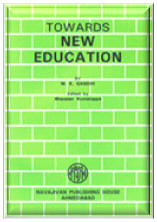
P.O. SEVAGRAM, DIST.WARDHA 442102, MS, INDIA. Phone: 91-7152-284753
FOUNDED BY MAHATMA GANDHI IN 1936
Towards New Education

TOWARDS NEW EDUCATION
Written by :M. K. Gandhi
Table of Contents
- PART I : INADEQUACY OF PREVAILING EDUCATION
- PART II : FORESHADOWING OF A NEW TYPE OF EDUCATION
- PART III : NEW EDUCATION
- PART IV : THE QUESTION OF RELIGIOUS EDUCATION
- PART V : THE LANGUAGE PROBLEM
- PART VI : COMPULSORY EDUCATION
- PART VII : EDUCATION OF SPECIAL GROUPS
- PART VIII : HIGHER EDUCATION
- Glossary
About This Book
Written by : M. K. Gandhi
Edited by : Bharatan Kumarappa
First Edition : October 1953
I.S.B.N : 81-7229-078-0
Printed and Published by : Jitendra T. Desai
Navajivan Mudranalaya,
Ahmedabad - 380 014,
India.
© Navajivan Trust, 1953
Download
PART III : NEW EDUCATION
To Teach Self-Reliance and Respect for Manual Labour
Self-reliance
As a lover of the Gurukula, I may be permitted to offer one or two suggestions to the Committee and the parents. The Gurukula boys need a thorough industrial training if they are to become self-reliant and self-supporting. It seems to me that in our country in which 85 per cent of population is agricultural and perhaps 10 per cent occupied in supplying the wants of the peasantry, it must be part of the training of every youth that he has a fair practical knowledge of agriculture and hand-weaving. He will lose nothing if he knows a proper use of tools, can saw a piece of board straight and build a wall that will not come down through a faulty handling of the plumber's line. A boy who is thus equipped, will never feel helpless in battling with the world and never be in want of employment. A knowledge of the laws of hygiene and sanitation, as well as the art of rearing children, should also form a necessary part of the Gurukula lads. The sanitary arrangements at the fair left much to be desired. The plague of flies told its own tale. These irrepressible sanitary inspectors incessantly warned us that in point of sanitation all was not well with us. They plainly suggested that the remains of our food and excreta need to be properly buried. It seemed to me to be such a pity that a golden opportunity was being missed of giving to the annual visitors practical lessons on sanitation. But the work must begin with the boys. Thus the management would have at the annual gathering three hundred practical sanitary teachers. Last but not least, let the parents and the Committee not spoil their lads by making them ape European dress or modern luxuries These will hinder them in their afterlife and are antagonistic to brahmacharya. They have enough to fight against in the evil inclinations common to us all. Let us not make their fight more difficult by adding to their temptations.
Speeches and Writings of Mahatma Gandhi, pp. 334, 335
Manual Labour
You may ask : 'Why should we use our hands?' and say ' the manual work has got to be done by those who are illiterate. I can only occupy myself with reading literature and political essays.' I think we have to realize the dignity of labour. If a barber or shoemaker attends a college, he ought not to abandon the profession of abarber or shoemaker. I consider that a barber's rofession is just as good as the profession of medicine.
Speeches and Writings of Mahatma Gandhi, pp. 388, 389 ; 16-2-''16
Whatever may be true of other countries, in India at any rate where more than eight per cent of the population is agricultural and another ten per cent industrial, it is a crime to make education merely literary, and to unfit boys and girls for manual work in afterlife. Indeed I hold that as the larger part of our time is devoted to labour for earning our bread, our children must from their infancy be taught the dignity of such labour. Our children should not be so taught as to despise labour. There is no reason why a peasant's son after having gone to a school should become useless, as he does become, as agricultural labourer. It is a sad thing that our school-boys look upon manual labour with disfavour, if not contempt.
Young India, 1-9-1921
The Duty of Spinning
In any curriculum of the future, spinning must be a compulsory subject. Just as we cannot live without breathing and without eating, so is it impossible for us to attain economic independence and banish pauperism from this ancient land without reviving and without reviving home-spinning. I hold the spinning wheel to be as much a necessity in every household as the hearth. No other scheme that can be devised will ever solve the problem of the deepening poverty or the people.
How then can spinning be introduced in every home? I have already suggested the introduction of spinning and systematic production of yarn in every national school. Once our boys and girls have learnt the art they can easily carry it to their homes.
Young India, 19-1-1921